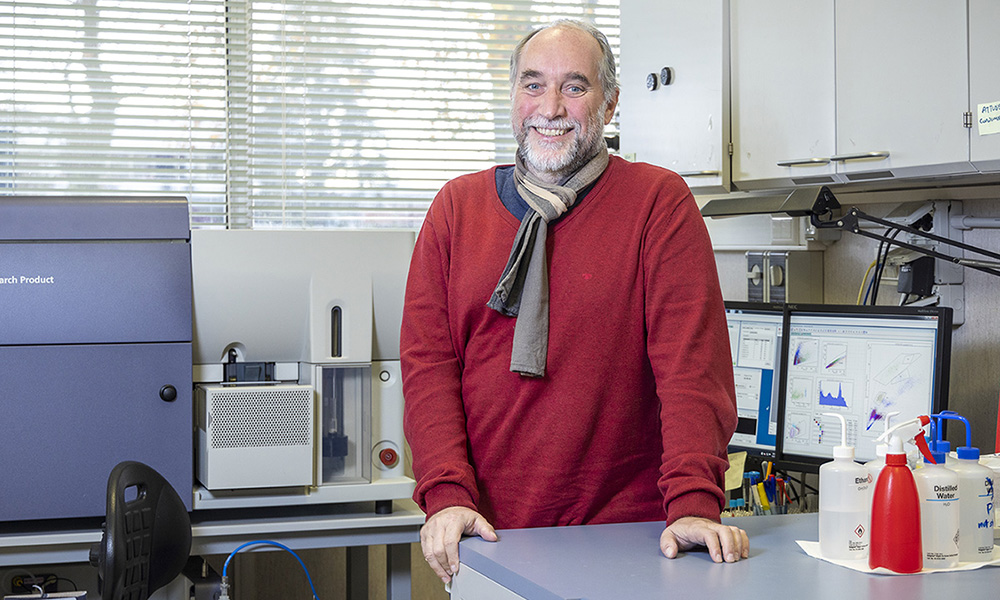
We are EMBL: Gerald Pfister on scientific support and field work
Gerald Pfister, Head of the Flow Cytometry Facility at EMBL Rome, talks about his private and professional passions and a return to his roots as part of the TREC project

Gerald Pfister joined EMBL Rome in 2021 as the Head of the Flow Cytometry (FACS) Facility. Originally from Austria, he obtained his first PhD in freshwater ecology and a second one in biomedical sciences. After specialising in flow cytometry, he moved to Brazil, followed by Belgium and Qatar, working in both commercial and academic institutions. Besides running the FACS facility in Rome, he has been recently involved in EMBL’s Traversing European Coastlines (TREC) project, providing scientific support and volunteering in the land and soil sampling team. The project allows him to combine his scientific knowledge and technical skills with his long-time passion for field work.
What’s the best part of working at EMBL?
There are several aspects that contribute to the best part of working at EMBL. If I had to summarise, it would probably be something like “positive, professional, and multicultural working environment”.
This includes the overall collaborative and supportive spirit between colleagues on-site and between sites. A real recognition and appreciation of each other’s skills, knowledge, and experiences. At EMBL you have the chance to meet and work together with people from so many different backgrounds, cultures, skills, and experiences and I believe this is a fantastic opportunity to bring out the best in everybody and to grow and develop both professionally and personally.
At what age did you decide you wanted to work in science, and what triggered that?
I knew very early that I wanted to work in science and I felt like a curious explorer as long as I can remember. Reading many books about behavioural sciences and ecology during my high school time finally led to the decision to study biology. However, during my studies, I always imagined myself exploring the rain forest for new species and did not picture myself ending up in a molecular biology lab in front of a flow cytometer!
What is one thing about you that most folks don’t know?
I am very passionate about photography and – in a greater sense – digital art. I especially love to take nature and landscape photographs. I have no problem spending several hours on a nice spot trying to compose a beautiful image. This is also true for clear nights, when observing and photographing the night sky through my telescope. I really enjoy these moments where it is just me and my camera. I usually share my pictures via social media and my own webpage, and I even run an online shop where I sell my photos and digital art on clothes and other stuff.
What is your passion?
My greatest passion is my family with my wife and two kids. I love spending time with them, talking to them, sharing thoughts with them, and traveling with them. Even if I truly enjoy my share of me-time, I appreciate and am very passionate about the quality time we share as a family.
I am also passionate about nature and living in harmony with nature as much as possible. This includes a more natural and sustainable lifestyle, treating life in general respectfully, but also appreciating, for example, the beauty of a flower, a full moon, or the setting sun on the horizon.
Can you describe your involvement in the TREC project?

I am just back after two exciting weeks in Ireland where I joined the TREC volunteer team to help with sample collection and data analysis in the field. This was an intense and very enjoyable experience for me. As a volunteer, I was involved in sampling of shallow water, sediment, soil, and aerosols on different sites around Galway. I learned new sampling skills and collected environmental data on beautiful coastal locations; I also experienced the hard physical workload, the long working hours, as well as the organisational challenges the field team is mastering in their daily work routine. I am really grateful for the experience – I met extraordinary people and made some true new friends during my Irish adventure!
In early 2024, when the TREC mobile laboratories will arrive in the southern Mediterranean area, I will be a local expert for flow cytometry, and I look forward to being actively involved in sample analysis and cell sorting, as well as in the training and outreach activities here in Italy.


